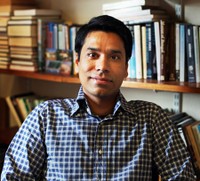Making of the Modern Indian City
Talk
2.0 hrs
January 04, 2015 4:00 pm Sunday

Lamakaan and Hyderabad Urban Lab invite you to a lecture/ Open discussion with Prof. Prashant Kidambi on 'Crisis' and the Making of the Modern Indian City on Sunday the 4th Jan at 4pm.
'Crisis' and the Making of the Modern Indian City
Recent years have seen an upsurge of interest in the contemporary Indian city. This ‘urban turn’ provokes a new engagement between contemporary urban research and Historical research on Indian cities. Using the key concept of 'crisis' in the making of urban India, this talk seeks to build a productive interdisciplinary dialogue on the future of Indian cities. Dr. Kidambi graduated from Nizam college, Hyderabad, JNU, Delhi and Cambridge University, UK and is currently at Director, Centre for Urban History at the University of Leicester, UK. His two main areas of research are - Indian Urban history and Social History of cricket.
Entry - Free
Organizer
Hyderabad Urban Lab
HUL works along two interrelated lines of engagements and commitments. One is a a creative, but academically rigorous multidisciplinary line of research on urbanization. This would include geography, history, economics, sociology, anthropology, etc. The other is community engagement through participatory action, teaching and training.
At HUL, we focus on land, labour and capital as key themes through which to try to generate knowledge about the city. For example, when we think about waste, we do so by asking questions like – where exactly is waste generated? where is it dumped? why doesnt the city have land for local decentralized waste-management? and so on; we also ask who the people handling, collecting, removing, transporting and processing waste are and why and under what conditions they do it. And, of course, we also ask who pays for what parts of this work, who makes profits and how, and so on.
In general, we see all projects as attempts to create what we call new communities of practice. That is, groups of people with shared social practices, whether it be map-making or lake bund cleanups or local surveys or story telling. We need to create new skill sets for people in order to live better in our cities and that is the idea of this lab – to borrow a metaphor, making social mashups.
